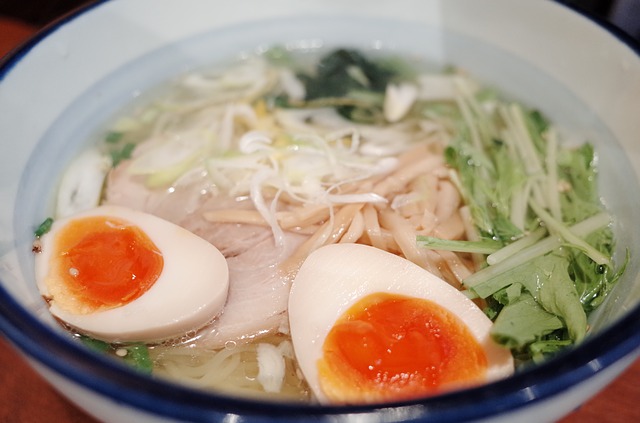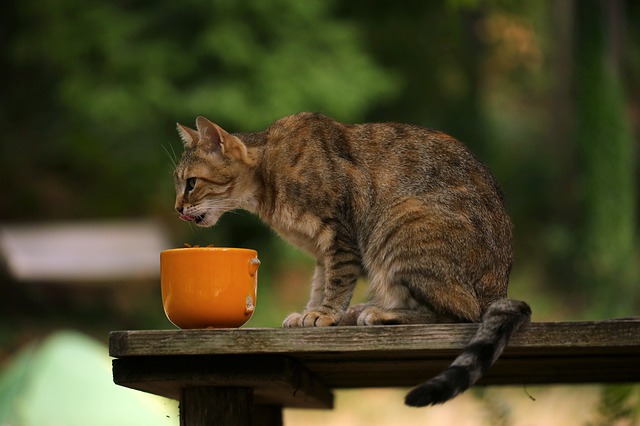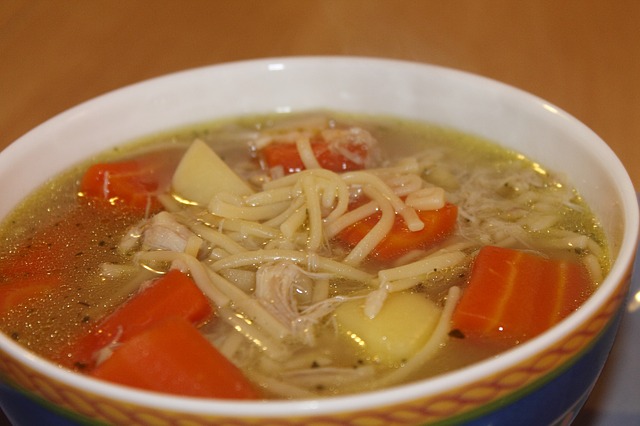One old fashioned soup recipes that we often reach for when our bodies succumb to winter sniffles is the mighty chicken noodle soup.
Many people find a sanctuary in the warming goodness of this amazing soup recipe, whose ingredients have been proven to provide the body with a significant boost of Vitamin A and selenium.
The chicken is packed with tons of protein; the vegetables are rich in vitamins A, C, and several antioxidants; and the noodles offer a serving of carbohydrates.
And like other warm liquids, the chicken broth can promote hydration and help clear your nasal passages. It is no wonder many people swear by this hearty soup to treat cold.
But can we share a bowl of chicken noodle soup with our cats? In other words…
Can Cats Have Chicken Noodle Soup?

The Short Answer:
Yes, chicken noodle soup is not toxic to cats, so it is safe for your kitty to sample.
However, like most human foods, your cat should only take it in moderation and there are a couple of safety precautions (and potential dangers) you should keep in mind before you share this soup recipe with your cat.
The Long Answer:
First things first, what is chicken noodle soup? What’s its composition?
Well, for starters, this classic soup recipe is formulated with savory chicken, wholesome vegetables (like celery, carrots, etc), onion, and egg noodles in a seasoned broth.
So, we can say that the main ingredients of a chicken noodle soup are chicken, vegetables, eggs, water, and flour.
Although all these ingredients are not necessary for a cat’s diet and offer very little when it comes to their nutritional content, they are all safe for cats.
And that’s why there shouldn’t be major health problems when your feline friend samples chicken noodle soup in moderation (or once in a while).
Having said that, there are a couple of health concerns you should be aware of if you plan to share a bowl of this soup recipe with your kitty on a regular basis, including:
1. Limited Nutritional Value
As hinted above, chicken noodle soup offers little nutritional value to your cat.
While things like grains and vegetables do find their way in cat foods, these ingredients only serve to add bulk to the food—nothing much when it comes to nutritional content that our fur babies need.
What’s more, your cat will never get all the important vitamins and minerals that she needs on a daily basis by eating chicken noodle soup.
2. Sodium
Store-bought chicken noodle soups are loaded with sodium that can be detrimental to the health of your dog.
Cats can’t tolerate high amounts of sodium, and snacking on commercial soup recipes meant for human beings can have serious consequences on their health.
Excess salt in cats can result in diarrhea, vomiting, lowered appetite, lethargy, excessive thirst, and urination.
In severe cases, it may even cause seizures, tremors, coma, and even death.
3. Onion & Garlic
It is typically safe to give your cat a bit of chicken noodle soup, but ensure that it is free of onion and garlic. Cats should not be allowed to consume onions, garlic, or any other food that contains thiosulphate. Thiosulphate is known to damage red blood cells in cats, resulting into a devastating condition commonly referred to as hemolytic anemia. So, if you want to share your homemade chicken noodle soup with your cat, don’t be tempted to add onions or garlic powder.
4. Too Much Carbs
Noodles have high amounts of carbohydrates, so allowing your cat to consume a lot of chicken noodle soup can make her obese.
Remember that your cat is an obligate carnivore. In other words, the main composition of an average feline’s diet should be proteins.
Your cat’s body cannot break down carbohydrates effectively.
Our bodies are equipped with an enzyme called amylase, which aids the breakdown of carbs. Unfortunately, our cats lack this enzyme.
When your cat consumes a lot of foods with high starch and carb contents, she can gain weight and put stress on her vital organs and body in general.
So, a sample of chicken noodle soup won’t do her any harm, but feasting on a bowl of this soup recipe regularly is never ideal for your feline friend.
Your fur-baby is also likely to face issues with going to potty in case there are stomach upsets or digestion problems.
If your cat is already battling weight gain issues or if they are suffering from insulin resistance or Diabetes type II, you shouldn’t give her chicken noodle soup.
Noodles are often formulated with refined flour, which can cause insulin spikes and worsen diabetes symptoms.
My Cat Has Accidentally Consumed A Lot of Chicken Noodle Soup: What Should I Do?

It depends on the ingredients of the noodle soup.
If it contained onions, garlic, or it was coated with tomato, cheese, butter, and other creamy sauces, consult your local vet immediately as these ingredients can be toxic to your cat.
However, if you are not sure whether or not the noodle soup contained these ingredients, consider watching your cat for 24-48 hours to be sure that she is not having any adverse reactions.
If you notice any weird symptoms like throwing up or lethargy, rush her to your vet immediately.
But if she is fine past 24-48 hours mark, then she will just be okay.
You may only need to find a way of limiting her access to human foods going forward.
Final Verdict
So, can cats have chicken noodle soup? There is no problem if you allow your cat to sample a bit of chicken noodle soup once in a while.
However, it is not recommended to feed a cat a lot of noodle soup regularly because it won’t fulfill her nutritional needs—on the contrary, it will just expose her to a wide range of health issues as highlighted above.
If you have to allow your cat to consume considerably large quantities of chicken noodle soup—perhaps to coax her to eat, speak with your vet first.
Every cat has unique dietary needs and your vet will advise you whether or not it is safe to go on with the plan.
Finally, remember that cats shouldn’t be given raw chicken noodles. Your cat’s body is not equipped to digest raw noodles, so it is likely to cause her stomach upset and other digestive issues.
Related Post: Can Cats Eat Chicken Nuggets?

Hi! I am Eleanor Price. I started this website after my cat, Louie, almost died from a case of botulism (a type of food poisoning often caused by bacteria that grow on food items). Turned out that my cat’s diet was the problem. I have made it my duty to provide the best information and recommendations about everything cat lovers need to know about their felines’ health and wellbeing. My goal is to find the most informative content on anything feline-related and share it with fellow hardworking kitty lovers.

